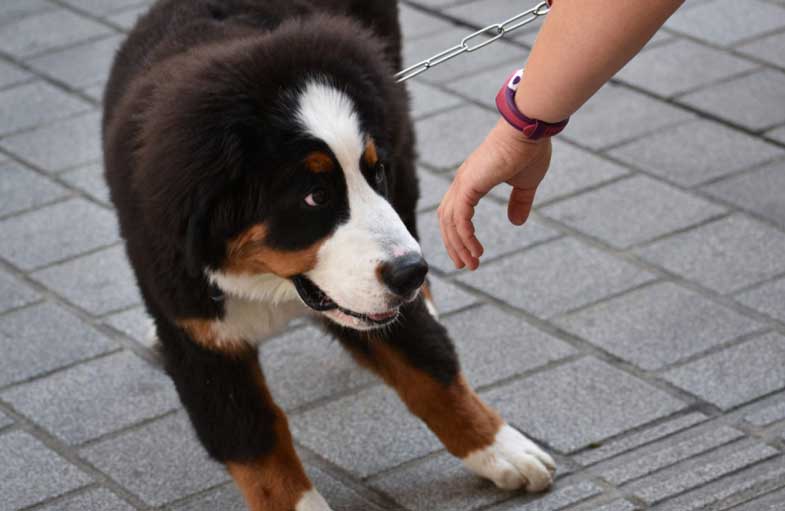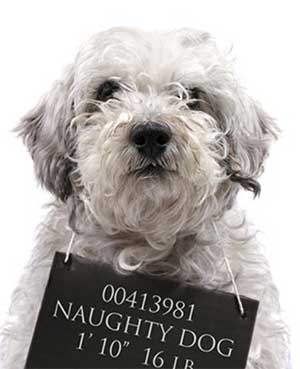To many dog owners, “socializing” their pet may seem a little odd. Are they supposed to show their dog which fork to use and the proper etiquette when eating with royalty or special guests? Did Miss Manners publish a book for dogs that they somehow missed? Well, sort of…When we speak about “social” skills we are referring to a dog’s ability to feel comfortable in a variety of settings: with other dogs, with people, with kids, at the park, at the kennel, at home when their owner leaves. Some dogs, based on their temperament, breed, their upbringing, diet and other factors seem to naturally interact comfortably within any environment. Most dogs do not automatically have these skills and they have to be taught. But the majority of dog owners don’t realize this and so they put up with bad behavior thinking that is just natural or something to be endured.
After owners attempt to fix this bad behavior on their own, and then become frustrated, someone in the household (usually the one who has to pay for the destroyed couch or chewed up shoes) makes the decision to take the dog to the shelter or drop them off at the end of a long country road. Each year about 6.5 million animals end up in one of the 14,000 shelters or rescue groups in the US. Last year 733,000 pets were euthanized. So, poor social skills, lead to bad behavior, then owner frustration, then the shelter where many are killed. That is why socialization skills are really code for survival skills.

Unfortunately, we see this scenario playing out every day in our facilities. One intervention is training. According to a 1999 study, 25% of dog owners seek training. Training saves hundreds of thousands of dogs every year, and equally if not more important, proper training dramatically enriches the quality of life between owners and pets. Imagine a scenario where you can take your dog anywhere and be confident that both you and the dog are having a good time.
There are a variety of factors that contribute to a lack of social skills:
 Lack of owner knowledge: People just don’t know why their dog does what it does. They don’t know how to think like a dog. Most peoples’ frame of reference for how to raise pets (and kids for that matter) is how pets were raised in the household where they grew up. That is great if your mom or dad was a professional dog trainer. Also, we know a lot more today about training methodology, nutrition, and the importance of socialization than we did one or two generations ago.
Lack of owner knowledge: People just don’t know why their dog does what it does. They don’t know how to think like a dog. Most peoples’ frame of reference for how to raise pets (and kids for that matter) is how pets were raised in the household where they grew up. That is great if your mom or dad was a professional dog trainer. Also, we know a lot more today about training methodology, nutrition, and the importance of socialization than we did one or two generations ago.- Lack of owner time, commitment, or resources: People are busy. Jobs, kids, household chores etc. Who has time to invest in learning how to solve pet problems and then applying the learning to the pet and situation? People will spend hundreds if not thousands of dollars on a dog. They may have to replace hundreds if not thousands of dollars in destroyed carpet, furniture, landscaping, car interiors, etc., but won’t spend money on training. Or they simply don’t have the money, especially in these trying times.
- Lack of exposure: People simply don’t expose their dogs to a variety of situations so that the dog gets comfortable in these different environments. If you never took your child to a restaurant, how would they learn how to act when eating out in public?
- Pre-mature removal from the litter as a puppy: Dogs learn a lot of basic social skills as pups with their litter mates. If you bite too hard, the other puppies won’t play with you. If you play too rough, then you will be playing alone. Momma dog may leave, but she will come back and everything will be OK. Many behavioral problems we see in dogs later in their development can be traced back to dogs being separated from their pack at 5-6 weeks instead of 8-10 weeks. That extra few weeks can make all the difference in the world in many dogs’ development. Just because they may be weaned at 6 weeks doesn’t mean they have learned everything they need to know.
- Diet: A lot of dog food is simply crap. Poor, or low-quality ingredients and preservatives impact a dog’s growth and development and cause strain on internal organs. Dr. Marty (a well-known veterinarian and “vet to the stars”) in his book “The Nature of Animal Healing” discusses the relationship between diet and dog temperament. In humans, serotonin, called the happy chemical, contributes to well being and happiness. In dogs, serotonin is manufactured in the digestive tract. Preservatives found in dog food destroy or retard the production of serotonin. So bad behavior in many dogs can be traced to low production of serotonin due to the ingredients and preservatives in their dog food.
So, what can dog owners do to improve their dog’s socialization skills? Expose your dog to a variety of situations, the earlier the better. Go to Lowes, Tractor Supply, restaurants (where allowed), the park and other places. Take treats and reward your dog for proper behavior in these new environments. Take your dog to daycare. Doggie daycare can be very therapeutic. It exposes the dog to a new environment and allows them to interact with other dogs in a supportive, supervised environment. And they will get lots of exercise.
We are not big fans of dog parks. In our experience many dog park users don’t follow good dog etiquette and common sense which may result in injury (dog bite) or illness (Bordetella) to you or your dog. We had an employee bit by a dog at a dog park, the owner fled the scene, and our employee had to have rabies shots.
Get training. Many owners don’t feel they can take their dog other places because they don’t walk on a lead, or they bark at other dogs (or worse) or generally act up. Training will help you manage these situations. Recently Tin Woof Inn has become a Dog Wizard training facility. We are extremely excited about this partnership. In the past when we trained we taught dogs (and their owners) how to sit, stay, come when called etc. And this was very helpful. However, we fixed the behavior but we didn’t fix the dog. The Dog Wizard system helps us fix the dog first and then overlays specific behaviors, usually obedience-oriented instructions. Put another way, the Dog Wizard system teaches your dog what to do when it isn’t sitting, staying or walking on a lead. For example, you have a dog that chases cars. We can get your dog to stop chasing cars. But why is your dog chasing cars? The Dog Wizard system deals with the underlying behavior or why your dog chases cars. We give your dog coping skills. If you feel you might need training please ask us about Dog Wizard. The program offers free evaluations and solutions tailored to your situation and budget.

We have seen some situations, especially with shelter or adopted dogs, where understanding the dog’s breed would provide insights into the dog’s behavior. We had a client with a shelter dog that had a number of behavioral issues. It was extremely frightened, very dog reactive and generally very reactive to people. If you came up to the dog slowly, with a treat in your hand, the dog would take the treat, roll over on his back (submissive gesture) and as you rubbed his stomach he would jump up and try to take your face off. The owner did DNA testing and we found that the dog was 25% Schipperke (a small dog originally bred to kill rats on ships). We have some experience with this breed, and they are notoriously unpredictable and ill tempered. Knowing this was extremely helpful in understanding and working with this dog. So, DNA testing can be an important part in understanding behavioral issues.
So, for the geeks and mathematicians out there:
Lack of socialization + bad behavior + owner frustration = trip to shelter + death
Lots of dogs have behavioral issues, in most cases because they haven’t been taught coping skills through proper socialization. There are lots of effective ways to socialize you dog, but you have to do it, not leave it to chance. Daycare and training are two excellent ways to get some outside expert help to get your dog on a path to a happy, reliable and productive relationship with you, their owner.
Scott Templeton and his wife Gale own 3 Tin Woof Inn locations (Morehead, Ashland, Frankfort). Scott has been in the pet industry professionally since 1993. He has designed, managed or operated nearly 20 pet facilities including two local pet shelters in Kentucky. He has supervised more than 269,000 pet stay days in his pet career. Prior to focusing on the pet industry he worked in senior marketing and operations management for 7-Eleven, Shell, Exxon-Mobil, Circle K, GTech and Intellimat in the US and UK. Scott and Gale live in Morehead with their 3 Australian Shepherds, 2 Border Collies and 3 cats.


